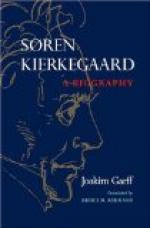|
This section contains 9,225 words (approx. 31 pages at 300 words per page) |

|
SOURCE: "Concept of Existence," in Kierkegaard, Konstruktion des Asthetischen, 1962, published as Kierkegaard: Construction of the Aesthetic, translated and edited by Robert Hullot-Kentor, University of Minnesota Press, 1989, pp. 68-85.
In the following essay, originally written in 1962, Adorno critiques Kierkegaard's doctrine of existence, focusing on the philosopher's concern with paradox, ambiguity, and subjectiveness.
Existence and Truth
Of all of Kierkegaard's concepts, that of existence is currently the most prominent. If his struggle with "official Christianity" has lost its urgency for a mentality in which the established church and individual life long ago left behind the dialectic in which Kierkegaard found them linked, however antagonistically; if the abstract transcendence of the idea of God—which dialectical theology extracts from Fear and Trembling and the Philosophical Fragments—appears all too bound to positive dogmatics and at the same time all too wanting in any binding content to become a significant epochal concern...
|
This section contains 9,225 words (approx. 31 pages at 300 words per page) |

|


